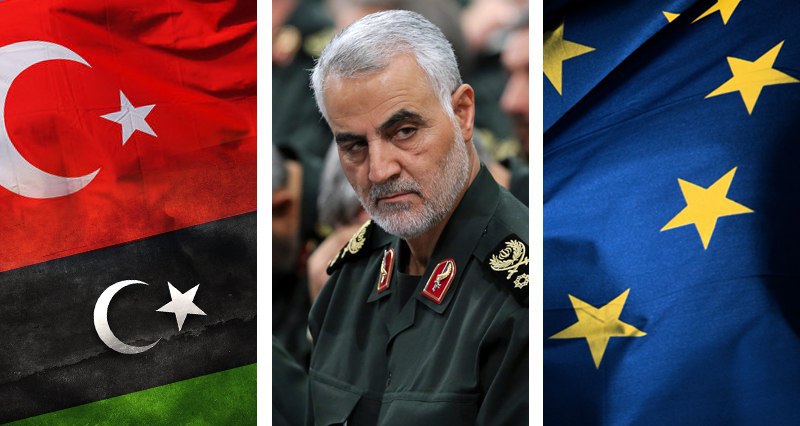Qassem Soleimani’s assasination
The main political event of the first week of 2020 was undoubtedly Washington’s assassination of Qassem Soleimani, Сommander of the IRGC’s Al-Quds Force.(https://unitedworldint.com/6915-soleimanis-assassination-the-geopolitical-consequences-for-the-middle-east-and-the-west/)
Tensions in Iraq had been escalating throughout the week. On December 29, the US attacked positions of Kataib Hezbollah after accusing Iran of interfering in regional affairs, killing 25 people. In response, on December 31, protestors stormed the US Embassy in Baghdad. The United States then took extreme measures, killing Suleimani and his comrades at a Baghdad airport on January 3.
The event provoked an international scandal: a number of countries and political forces condemned the US’ actions (Iraq, Turkey, Russia, China), while others issued support (Israel, Saudi Arabia, numerous European politicians, etc.). Iran, in turn, promised revenge for the murder of one of the most influential military leaders.
On January 5, the Parliament of Iraq voted to break their anti-ISIS coalition with the US, and called for the immediate withdrawal of foreign troops from the country, Al-Arabiya reported.
By eliminating General Soleimani, a Shia hero highly valued in Iraq and Syria, the US significantly undermined its influence in the Middle East. The attack will strengthen anti-American sentiment both in Iraq, Iran, Syria and Turkey (despite the fact that Turkish politics are strongly influenced by anti-Shia Islamists). Trump, who came to power under slogans of ending wars and renouncing globalist hegemony, who has criticized previous administrations for interventionism, has proven himself to be their equal in conducting neoconservative foreign policy agenda coordinated with Israel. Trump’s decision will weaken the possibility of US control over the Middle East in the medium term, and in the short term, it will cause a surge in anti-American sentiment.
Iran’s influence in Iraq is likely to increase again (despite previous protests, which will not be able to continue with the same intensity due to Shia solidarity in the face of the US). After the assassination of Soleimani, both Shia and most Sunni forces have come to see the US an imperialist force that is willing to use illegal terrorist methods.
Turkey readies for a campaign in Libya
Recep Tayyip Erdogan, President of Turkey, reported that he was sending troops to Libya. According to him, the troops will coordinate the Al-Sarraj`s Government of National Accord.
Ankara’s goal is to support the legitimate government, the head of state said on CNN Turkey.
According to preliminary data, the support will include air, land and sea forces aiming to repel Khalifa Haftar’s offensive.
On January 2, the Turkish parliament passed a bill permitting troops to be sent to Libya (for – 325 deputies, against – 184). The ruling Justice and Development Party (AKP), part of the ruling MHP coalition, strongly supported sending troops to Libya. Members of the CHP, HDP, as well as the Saadet and Iyi Parti parties, spoke out against it. Libya’s Government of National Accord of Libya officially requested military assistance from Turkey. On November 27, Al-Sarraj government and Erdogan signed a military cooperation agreement to that effect.
For Ankara, Al-Sarraj’s support is particularly important, especially in relation to a memorandum on maritime boundary demarcations in the Eastern Mediterranean (signed on 27 November 2019) https://unitedworldint.com/6553-mavi-vatan-perspectives-of-turkish-sea-power/ . The memorandum is important for Ankara as it strengthens the new contours of Turkish influence in the Eastern Mediterranean and is critical to the implementation of the geopolitical doctrine of Mavi Vatan. Mavi Vatan is important for Turkey, as the memorandum weakens the Greek-Egyptian-Israeli block’s foothold in the contested areas of the mediterranean.
As a result of the treaty with Libya, Turkey has developed serious contradictions with the League of Arab States, which condemned the decision. The League called for efforts to “prevent foreign intervention.” Ankara criticized their respond in turn.
Instability in the EU
In France, large-scale protests against the new pension system proposed by the liberal government of President Emmanuel Macron took place. Thousands of protesters took to the streets of Paris on Saturday to protest the president’s unpopular policy. The demonstrations were united with the protests of “yellow vests.”
The new bill would lead to certain categories of pensioners losing their privileges. The proposal has led to strikes across France which have been ongoing for over a month. Trade unions are dissatisfied with the fact that, if the bill is passed, millions of people will have to work after turning 62, the previous retirement age.
Police used tear gas to try to contain the protests. Jean-Luc Melanchon, leader of the “France Insoumise” movement, actively supported the protests.

















Leave a Reply